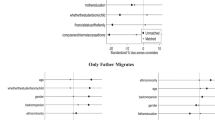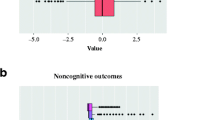Abstract
The aim of this study is to examine the lasting effects of childhood experiences of being left behind on the cognitive abilities of Chinese adults. To investigate the impact of children being left behind on adult cognitive capacity, we utilized an instrumental variable (IV) approach and the instrumental variable quantile regression (IVQR) method with data from the 2010 China Family Panel Studies (CFPS). The results reveal that childhood experiences of being left behind, especially by mothers during late childhood, have significant negative effects on cognitive abilities in adulthood. Short-term and long-term left-behind experiences both have detrimental effects on cognitive development. Women, those born in the late 1980s, individuals from middle and low-income households, those living in rural areas, and those with siblings are more vulnerable to these effects.The IVQR analysis demonstrates that the negative effects of childhood experiences of being left behind are more pronounced among those with lower levels of cognitive ability. Furthermore, our findings suggest that educational human capital could serve as a possible channel linking early left-behind experiences to adult cognitive ability. Our research provides a better understanding of how parental migration can impact the cognitive development of children left behind in China and other developing countries in the long term. These study results may assist policymakers in implementing measures to protect left-behind children from negative repercussions.



Similar content being viewed by others
Data availability
The data that support the conclusions of this investigation are accessible from the Institute of Social Science Survey (ISSS) of Peking University in China, however access to these data is restricted since they were utilized under permission for the current study and are thus not publicly available. However, data are available from the authors upon reasonable request and with permission of the Peking University Institute of Social Science Survey (ISSS).
Notes
In the word test, a total of 34 words were tested. Each word had 1 point, with a total of 34 points. In the math test, there were a total of 24 questions. Each question had 1 point, with a total of 24 points. The total test score is the sum of the word and math test scores.
During the 2010 CFPS, respondents were asked to report on their experiences with being left behind during two time periods: ages 0–3 and 4–12. The questions about the left-behind experience were: (1) 'How long did your father/mother live apart from you before you turned three years old (in weeks)?' and (2) 'Between the ages of 4 and 12, how long did your father/mother live apart from you (in weeks)?
References
Adhvaryu, A., Bednar, S., Molina, T., Nguyen, Q., & Nyshadham, A. (2020). When it rains it pours: The long-run economic impacts of salt iodization in the United States. Review of Economics and Statistics, 102, 395–407.
Adi-Japha, E., & Klein, P. S. (2009). Relations between parenting quality and cognitive performance of children experiencing varying amounts of childcare. Child Development, 80(3), 893–906.
Antman, F. M. (2012). Gender, educational attainment, and the impact of parental migration on children left behind. Journal of Population Economics, 25, 1187–1214.
Bai, Y., Zhang, L., Liu, C., Shi, Y., Mo, D., & Rozelle, S. (2018). Effect of parental migration on the academic performance of left behind children in North Western China. The Journal of Development Studies, 54, 1154–1170.
Butikofer, A., & Peri, G. (2017). The Effects of Cognitive and Noncognitive Skills on Migration Decisions. NHH Dept. of Economics Discussion Paper, (17).
Cadsby, C. B., Song, F., & Yang, X. (2020). Are ‘left-behind’ children really left behind? A lab-in-field experiment concerning the impact of rural/urban status and parental migration on children’s other-regarding preferences. Journal of Economic Behavior & Organization, 179, 715–728.
Carneiro, P., & Heckman, J. (2003). Human capital policy. In Heckman et al. (Eds.), Inequality in America: What role for human capital policies? MIT Press.
Checchi, D., Heckman, J. J., & Krueger, A. (2005). Inequality in America - what role for human capital policies? Journal of Economics, 86(1), 85–89.
Chen, X., Liang, N., & Ostertag, S. F. (2017). Victimization of children left behind in rural China. Journal of Research in Crime and Delinquency, 54(4), 515–543.
Chen, Y., Fan, Z., Gu, X., & Zhou, L. A. (2020). Arrival of young talent: The send-down movement and rural education in China. American Economic Review, 110(11), 3393–3430.
China Ministry of Civil Affairs. (2018). Data on left-behind children in rural areas. (in Chinese).
Connelly, R., Roberts, K., & Zheng, Z. (2012). The role of children in the migration decisions of rural Chinese women. Journal of Contemporary China, 21, 93–111.
Cui, H., Smith, J. P., & Zhao, Y. (2020). Early-life deprivation and health outcomes in adulthood: Evidence from childhood hunger episodes of middle-aged and elderly Chinese. Journal of Development Economics, 143, 102417.
Francesconi, M., & Heckman, J. (2016). Child development and parental investment: Introduction. The Economic Journal, 126(596), F1–F27.
Gao, Y., Bai, Y., Ma, Y., & Shi, Y. (2018). Arrival order for positive and negative effects of parental migration on the academic performance of left-behind children in rural China. Studies in Labor Economics, 6(3), 97–113. (in Chinese).
Glewwe, P., Huang, Q., & Park, A. (2017). Cognitive skills, noncognitive skills, and school-to-work transitions in rural China. Journal of Economic Behavior & Organization, 134, 141–164.
Guo, L., & Qu, J. (2019). The Heckman curve and human capital investment—thoughts on and lessons from increasing public expenditures on preschool education. Economic Perspectives, (1), 116–130. (in Chinese).
Havari, E., & Mazzonna, F. (2015). Can we trust older people’s statements on their childhood circumstances? Evidence from SHARELIFE. European Journal of Population, 31, 233–257.
Heckman, J. J. (2007). The economics, technology, and neuroscience of human capability formation. Proceedings of the National Academy of Sciences, 104, 13250–13255.
Heckman, J. J., Stixrud, J., & Urzua, S. (2006). The effects of cognitive and noncognitive abilities on labor market outcomes and social behavior. Journal of Labor economics, 24(3), 411–482.
Hu, S. (2019). It’s for our education’: Perception of parental migration and resilience among left-behind children in rural China. Social Indicators Research, 145, 641–661.
Ko, P.-C., & Yeung, W.-J.J. (2019). Childhood conditions and productive aging in China. Social Science & Medicine, 229, 60–69.
Li, Q., Sun, R., & Li, R. (2014). The pattern of rural laborers going out for work and the learning performance of left-behind children——an analysis based on the generalized propensity score matching method. Chinese Rural Economy, (10), 4–20. (in Chinese).
Li, Q., Liu, G., & Zang, W. (2015). The health of left-behind children in rural China. China Economic Review, 36, 367–376.
Li, X., Yu, J., Dai, J., & Zhang, L. (2019). The latest development of new human capital theory from the perspective of life cycle: Measurement, formation and function. Studies in Labor Economics, 7(6), 110–131. (in Chinese).
Li, Y. (2013). Self-selection, migration, and children educational performance: Evidence from an underdeveloped Province in rural China. China Economic Quarterly, 12(3), 1027–1050. (in Chinese).
Lian, Y., Li, W., & Huang, B. (2014). A study on the impact of children’s migrant work on parents’ health and life satisfaction. China Economic Quarterly, 14(01), 185–202. (in Chinese).
Liu, J., Zheng, X., Parker, M., & Fang, X. (2020). Childhood left-behind experience and employment quality of new-generation migrants in China. Population Research and Policy Review, 39, 691–718.
Meng, X., & Yamauchi, C. (2017). Children of migrants: The cumulative impact of parental migration on children’s education and health outcomes in China. Demography, 54, 1677–1714.
Mu, R., & De Brauw, A. (2015). Migration and young child nutrition: Evidence from rural China. Journal of Population Economics, 28, 631–657.
Nilsson, A. (2015). Who suffers from unemployment? The role of health and skills. IZA Journal of Labor Policy, 4(1), 1–24.
Radl, J., Salazar, L., & Cebolla-Boado, H. (2017). Does living in a fatherless household compromise educational success? A comparative study of cognitive and non-cognitive skills. European Journal of Population, 33(2), 217–242.
The All-China Women’s Federation Research Group. (2013). Research report on the status of migrating children left-behind children in rural areas. China Women’s Movement, 06, 30–34. (in Chinese).
UNICEF Report. (2015). The State of China's Children 2015 - Facts and Figures.
Wang, H., Cheng, Z., & Smyth, R. (2018). Do migrant students affect local students’ academic achievements in urban China? Economics of Education Review, 63, 64–77.
Wang, H., Cheng, Z., Wang, B. Z., & Chen, Y. (2021). Childhood left-behind experience and labour market outcomes in China. Journal of Business Research, 132, 196–207.
Wang, S. X. (2014). The effect of parental migration on the educational attainment of their left-behind children in rural China. The BE Journal of Economic Analysis & Policy, 14, 1037–1080.
Wu, Q., Lu, D., & Kang, M. (2015). Social capital and the mental health of children in rural China with different experiences of parental migration. Social Science & Medicine, 132, 270–277.
Xie, Y., & Hu, J. (2014). An introduction to the china family panel studies (CFPS). Chinese Sociological Review, 47, 3–29.
Ye, J. Z. (2019). Research on the left-behind population in rural areas: Basic standpoint, misunderstanding and theoretical turn. Population Research, 2, 21–31. (in Chinese).
Zhang, H., Behrman, J. R., Fan, C. S., Wei, X., & Zhang, J. (2014). Does parental absence reduce cognitive achievements? Evidence from rural China. Journal of Development Economics, 111, 181–195.
Zhao, Q., Yu, X., Wang, X., & Glauben, T. (2014). The impact of parental migration on children’s school performance in rural China. China Economic Review, 31, 43–54.
Zhou, C., Sylvia, S., Zhang, L., Luo, R., Yi, H., Liu, C., …, & Medina, A. (2015). China’s left-behind children: Impact of parental migration on health, nutrition, and educational outcomes. Health Affairs, 34, 1964–1971.
Funding
This work was supported by the National Social Science Fund of China (Grant No. 21AJL015), and the Natural Science Youth Fund of Inner Mongolia Autonomous Region, China (Grant No. 2023QN07006).
Author information
Authors and Affiliations
Contributions
All authors were involved in the conception and design of the study. Material preparation, data collection, and analysis were conducted by [Yajun Wang] and [Xiangming Fang]. The first draft of the manuscript was written by [Yajun Wang] and [Xiaodong Zheng]. Suggesting revisions and participating in revisions were done by [Xiangming Fang], [Bin Tang], and [Qiang Jin]. Revisions based on external review comments were made by [Xiangming Fang] and [Yajun Wang]. All authors provided comments on previous versions of the manuscript. All authors read and approved the final manuscript.
Corresponding author
Ethics declarations
Ethical statement
The Biomedical Ethics Committee at Peking University in China reviewed and authorized the experiments involving human volunteers. Review lot number: IRB00001052-14010.
Consent to participate
All individual participants in the research gave their informed permission.
Conflict of interest
The authors have stated that they have no competing interests in this work.
Additional information
Publisher's note
Springer Nature remains neutral with regard to jurisdictional claims in published maps and institutional affiliations.
Appendix
Rights and permissions
Springer Nature or its licensor (e.g. a society or other partner) holds exclusive rights to this article under a publishing agreement with the author(s) or other rightsholder(s); author self-archiving of the accepted manuscript version of this article is solely governed by the terms of such publishing agreement and applicable law.
About this article
Cite this article
Wang, Y., Zheng, X., Tang, B. et al. Childhood left-behind experience and adulthood cognitive abilities: evidence from China. Curr Psychol 43, 6371–6383 (2024). https://doi.org/10.1007/s12144-023-04808-6
Accepted:
Published:
Issue Date:
DOI: https://doi.org/10.1007/s12144-023-04808-6




